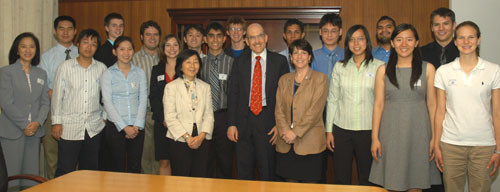

June 4 - Sixteen American undergraduate students recently visited me at the U.S. Embassy to tell me about their "Nano Japan" summer internship program. These young and extremely bright students arrived in Japan last month to begin a three-week cultural and language immersion program in Tokyo, followed by an eight-week research internship with Japan's leading nanotechnology laboratories.
They told me that Japan and the United States together account for about 60% of the nanotechnology research and development spending worldwide. Therefore, the U.S. National Science Foundation strongly supports this program that seeks to help young American scientists and engineers build networks of peers with Japanese researchers in their fields.

Students from the National Science Foundation's Nano Japan program stopped by the Embassy for a briefing.
The American students were very articulate in explaining their planned research in terms that I, a non-scientist, could understand. These students seemed very excited at the opportunity to work with world-famous Japanese scientists at laboratories in Tokyo, Osaka, Sendai, Hokkaido and Nagano. One mentioned how honored she was to meet in person a professor whose theories she had learned about in her college classroom. Another told me he had been studying Japanese since high school, and many of his high school classmates had come to Japan for language immersion programs during summer vacation. He chose instead to gain experience working in American science laboratories during the summer, but he always wanted to visit Japan. Therefore, he was delighted with the opportunity to do both - learn about Japanese culture and gain additional experience in his scientific field.
When I asked the students why they chose to spend their summer vacation researching nanotechnology in a Japanese laboratory, they said they were interested in Japanese culture and also in Japanese technology. One of the students said he was a double major in philosophy and in physics. He wanted to learn about Japanese ways of thinking as he pursued his research at a Japanese university. Several others had also studied the Japanese language as well as history and culture even as they pursued their majors in science and engineering at their American universities.
I left our meeting feeling energized and optimistic about the future of U.S.-Japan scientific collaboration. If young American scientists like these are so attracted to Japanese culture, then surely they will build a strong network with Japanese counterparts and forge ever more collaborative relationships to advance human knowledge. What a wonderful example of Cool Japan and Hi-Tech Japan!
Until next time,
Jim
Comments Welcome!